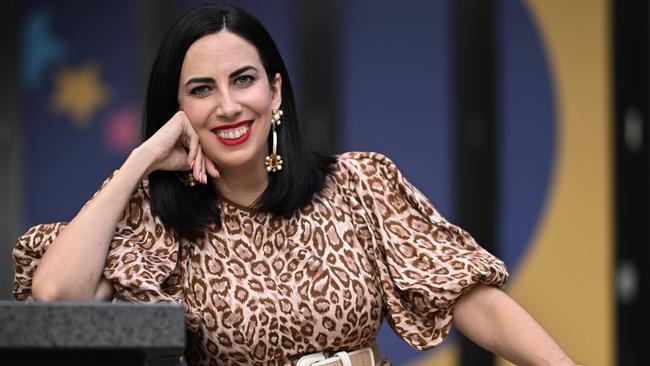The one poem we need to read right now
Poet Sarah Holland-Batt prescribes one poem as ‘medicine’ for these turbulent times.

Sarah Holland-Batt is a poet. She talks to Review about how poetry can help us to see the beauty in the world, why it can be difficult to empathise with those unlike us and her new anthology opera, The Sopranos.
Review: We’re living in such challenging times with the Russian invasion of Ukraine, the east-coast floods, and the pandemic still bubbling away in the background. Could you prescribe one poem as medicine?
Sarah Holland-Batt: One poem that comes back to me a lot was written by the Polish poet Adam Zagajewski just after 9/11. Try to Praise the Mutilated World acknowledges that terrible things surround us all the time, but also that we have to pay attention to the beauty in the world. At the moment it’s easy to spiral into panic or anxiety watching the news. I think back to just after 9/11; that also felt like such a seismic shift and as though something profound had changed forever. The poem is a consoling poem. It is sort of a challenge to the reader to go out and find the beauty in the simple things in their life, while not ignoring what’s going on. We have to also carry with us that it’s just such a profound privilege to be alive and that there’s always some beauty.
-
Try to Praise the Mutilated World
By Adam Zagajewski (translated by Clare Cavanagh)
Try to praise the mutilated world.
Remember June’s long days,
and wild strawberries, drops of rosé wine.
The nettles that methodically overgrow
the abandoned homesteads of exiles.
You must praise the mutilated world.
You watched the stylish yachts and ships;
one of them had a long trip ahead of it,
while salty oblivion awaited others.
You’ve seen the refugees going nowhere,
you’ve heard the executioners sing joyfully.
You should praise the mutilated world.
Remember the moments when we were together
in a white room and the curtain fluttered.
Return in thought to the concert where music flared.
You gathered acorns in the park in autumn
and leaves eddied over the earth’s scars.
Praise the mutilated world
and the gray feather a thrush lost,
and the gentle light that strays and vanishes
and returns.
-
R:You’ve written an anthology opera called The Sopranos, for Opera Queensland. We’re guessing it has nothing to do with the Italian mafia?
SHB: The joke of the title is that the TV show The Sopranos is obviously so bloody and gory and all about violence. Actually, when you look at the way women in opera are treated, there’s a lot of that as well: they’re poisoned, they’re raped, they’re murdered, they have to sacrifice themselves in quite an amazing array of ways. So the title is kind of a joke, but it’s also alluding to the paradox of sopranos being these exquisitely virtuosic artists having to play these quite gory fates.
R: Does your narrative try to reclaim the power for these women and swing the pendulum back in their favour?
SHB: The show draws on existing repertoire across the history of opera. So there’s some stuff from the beginnings of Monteverdi and then there’s 21st-century Australian female composers as well. There’s a wonderful piece by Poulenc called Dialogues of the Carmelites set in the French Revolution. It’s a story that actually happened; 16 Carmelite nuns refused to give up their faith and were executed by guillotine. There’s been some criticism in general of opera as an art form that potentially glorifies violence against women. But I think it’s also about looking at these women and acknowledging that many of them are part of history; these are real women. Opera does give us a chance to revisit those stories and that violence and see it in new ways.
R: You have said you hear poetry in your head, in a musical sense. How has this shaped your approach to writing for the opera?
SHB: I think it helps to be a poet in writing for performance in general, because poetry is all about the music of language. It’s a form that’s all about being memorable. It’s really an oral form. Often we read poetry on the page, but a really good poem should be able to be read out loud and have an impact. You can think of the libretto as a sort of poetry. Songs and poems have so much in common; unlike a novel you can hear them in a single setting, they’re often in the first person and they’re often about a moment of crisis or a moment of revelation.
R: You’ve often talked about the power of poetry to cultivate empathy. Is empathy a skill that can be learned or is it an innate quality?
SHB: Setting aside psychopaths, everyone has degrees of empathy. Often it’s easier to empathise with people who we perceive to be like us. That’s why people find stories that resonate with them, that have an element of “that looks familiar or reminds me of someone I love”. I think the challenge is when we can’t really see ourselves in that position. Poetry offers a really great portal to see, hear and listen to the perspectives of others who aren’t immediately like us, or who we don’t perceive to be like us.
R: You’re a fierce advocate for the rights of people in aged care. How is empathy a challenge in this context?
SHB: We all like to believe that we’ll never be in a position where we have to go into an aged care home, because to admit that is to admit to something really fundamentally challenging and frightening, which is that we’re mortal, one day we might be frail and one day we might be vulnerable. People say things like, “I’ll never go into an aged care home”. Or they’ll say “when I get old, I’m just going to pay for someone to look after me at home”. There’s a really high-level fantasy that somehow they will be exempt from that system. Somehow they will be the lucky ones who just die in their bed at home without having had any cognitive or physical decline.
R: You have a book, The Jaguar, coming out in May featuring poems about your late father and his experiences with Parkinson’s disease and ageing. What’s your hope for these poems?
SHB: Writing those was infinitely more difficult than writing about policy questions or particular failures of the federal government. I hope the poems put a human face to a story that’s often told in statistics. Aged care residents are also really segregated from the rest of the community. Poetry can bring us into that world that we see as quite distant, terrible, but sort of happening over there, rather than in our immediate purview.
The Sopranos runs at the Concert Hall, Queensland Performing Arts Centre, Brisbane, from March 29-April 2.




To join the conversation, please log in. Don't have an account? Register
Join the conversation, you are commenting as Logout